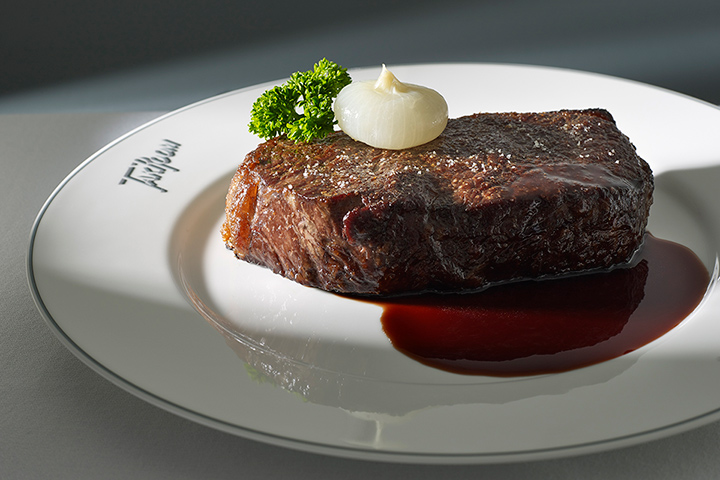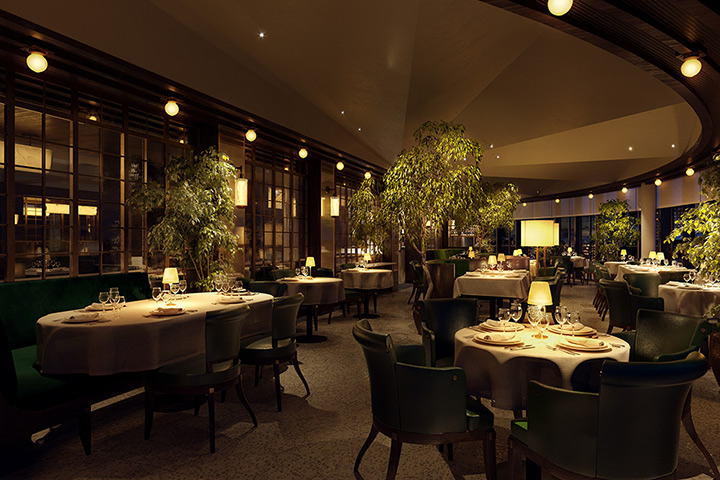什么叫餐饮本地化?这位大厨有独到见解
|
过去几年,精致餐饮和休闲餐饮之间的界限越来越模糊,越来越多的餐馆不再使用白色桌布——这是精致餐饮的标志之一,而看起来像社区餐厅的地方收费却越来越高,最贵的需要30美元起步。 走进TAK Room,这是纽约新地标哈德逊庭院(Hudson Yards)里的一处新建筑,是著名厨师托马斯·凯勒的最新餐厅,凯勒主理的品牌产品包括全国各地的Bouchon餐厅和烘焙帝国,加利福尼亚州扬特维尔的法国洗衣店餐厅(The French Laundry)和距离TAK Room不到一英里、位于哥伦布广场的Per Se。 TAK Room的外观可会让人误解,整体装修是中世纪风格,一个大型的开放式餐厅为三巡马提尼午餐做好了准备,当然了,还有那些熟悉的白色桌布。 然而凯勒坚持认为,TAK Room是一个休闲餐饮场所——或者他更愿意称之为“趣味餐饮”场所。 “它像美国版的法国小酒馆Bouchon一样,拥有全部的关注点和独特风格。”凯勒说,“它的点菜方式是按菜单点单。没有着装要求。它的出品都很休闲,每一种食物有参考点,是常见食物——无论是烤鸡、顶级牛排、土豆泥、蜜汁胡萝卜、巧克力蛋糕、蟹饼还是凯撒沙拉——所有的食物在我们的文化和这种饮食风格中都很常见。” 凯勒解释道,人们混淆了高级餐饮和休闲餐饮的价格。“因为我们菜单上有85美元的牛排,人们会说,‘好吧,这是高级餐饮’,这其实是混淆了食物的价格和餐厅风格。”他继续说,“价格与我们食材的质量有关,而与用餐体验的水平无关。我们必须意识到这一点。我敢说,我们的牛排肯定是我们可以从优质农场里采购的最好的牛排之一。它的价格是85美元,这个定价是因为它的成本,而不是因为我们是一家高级餐厅。” |
The lines between fine dining and casual dining have become increasingly blurred over the last several years, as more restaurants do away with white tablecloths, one of the hallmarks of fine dining, while places that might have seemed like a neighborhood spot are increasingly charging upwards of $30 just to start. Enter TAK Room, a new establishment in New York’s recently constructed Hudson Yards neighborhood and the latest restaurant from the acclaimed Chef Thomas Keller, whose portfolio includes the Bouchon empire of restaurants and bakeries nationwide, The French Laundry in Yountville, Calif., and Per Se, less than a mile away from TAK Room at Columbus Circle. But appearances might be deceiving at TAK Room, with its mid-century decor, a large opening dining room primed for a three-martini lunch, and yes, those familiar white tablecloths. And yet Keller insists that TAK Room is, in fact, a casual dining establishment—if not a “fun dining” one. “It has every bit of focus and uniqueness that Bouchon has as a French bistro in an American version,” says Keller. “It’s an a-la-carte menu. There’s no dress code. It’s food that is casual, food that has reference points, food that we all recognize—whether it’s a roasted chicken, a slice of prime rib, puréed potatoes, glazed carrots, a piece of chocolate cake, crab cake, a Caesar salad—all these things are very recognizable in our culture and this style of food.” People get confused with the price of a meal as it relates to fine dining or casual dining, Keller explains. “But because we have an $85 steak on the menu, people say, ‘Well, that’s fine dining’ And that’s where there’s confusion created between price and what style of dining it is,” he continues. “Price is related to the quality of our ingredients, not to the level of the dining experience. And we have to realize that. Our steak, I believe, is certainly one of the best that we can possibly source from an extraordinary farm. and it costs $85 because that’s how much it costs, not because it’s a fine dining restaurant.” |

|
凯勒把TAK Room描述为美国历史上某一段时期的餐厅:第二次世界大战后,更准确地说,是美国“最进步、最富魅力”的时代。 凯勒说:“我在这类餐厅长大,因为母亲经营着几家这样的餐馆,美国最好的餐馆就是这种风格的餐馆。”詹姆士·比尔德美食大奖获得者凯勒在母亲的餐厅里开启了厨师生涯,他说,他妈妈为了不让他惹麻烦,就让他踩在牛奶箱上站在水槽边洗碗。“我在那台洗碗机前学到了很多东西,当时不知道,但这些东西对我的职业生涯产生了巨大的影响。” 凯勒打趣说他对烹饪很感兴趣,因为他知道自己“不会打棒球赚钱”,他还说,厨房像棒球场一样,给他带来了同样的团队精神。 厨房还为他提供了旅行的机会,20世纪70年代,凯勒开始沿着东海岸的厨房旅行。到1977年,凯勒在罗德岛为导师罗兰·海宁工作,决心自己也要成为一名厨师。因为海宁是法国人,凯勒就跟着他学习法式烹饪方法,在法国从stagiaire(学徒)开始做起,然后回到美国,在西村开了一家名为Raquel的餐馆。虽然开业五年后,这家餐馆失败了(这个地方目前由Shake Shack Innovation Kitchen使用),但事实证明它是凯勒职业生涯的垫脚石。后来,凯勒于1994年接手了法国洗衣店餐厅,当时该餐厅已经开业17年了,凯勒自称是北加州这家米其林三星餐厅的“管家”。 “我们最终的任务是树立餐厅中的榜样,帮助提升行业标准。”凯勒说,“这样当团队成员离开我们餐厅时,他们去其他餐厅时——无论是他们自己的还是其他厨房或其他餐厅——他们能够充分利用从我们餐厅工作中得到的好的部分,加以拓展,帮助新的团队接受法国洗衣店餐厅教授给他们的理念和文化。” 本地是一种心态 无论是法国洗衣店餐厅,还是扬特维尔路边更实惠的Ad Hoc,抑或是遍布全国各地的Bouchon Bakery摊位,凯勒经营餐馆的第一要义就是使用最好的食材。虽然这些食材并不总是来自于附近的生产商,但这并不意味着他们不是从本地采购的食材。 “本地和地理概念无关——它与食材的品质有关。”凯勒坚称。对于他和员工来说,最重要的人就是提供优质食材的人。无论他们是渔夫、是觅食者还是园丁,凯勒都把他们视作商业伙伴。 “我们在讨论本地时,就好像这是一个地理定义。对我来说,本地与地理无关。”凯勒解释说,如果你问不同的人“本地”对他们意味着什么,你得到的回答会在25到100英里的范围不等。“没有人知道本地的真正定义。”凯勒继续说道,“和这个概念有关的是他们产品的质量,他们养什么,或者他们捕什么,或者他们去树林里找什么。如果你这么想的话,本地的概念就可以扩展到任何地方。” 凯勒用他从缅因州斯托宁顿的渔民那里得到的资源举了个例子,他表示如果没有渔民把龙虾、鱼、贻贝或蛤蜊送到大多数人认为已经算不上是本地的地方,这个社区就会荡然无存。“我们必须考虑这一点,因为我们买了他们的鱼,才继续维持着他们的社区。这不仅仅与渔民有关,还与老师、消防员、药剂师、图书管理员有关,因为渔民把鱼送到纽约市或加利福尼亚州扬特维尔或得克萨斯州的达拉斯,这个社区的每一个人都得到了扶持。” 或者这样想,凯勒提出:如果本地真的是个地理概念,那么假定我们都同意本地的概念是你居住的地方100英里以内的范围内。当地只有一个农民种胡萝卜,他不关心土地,也不关心你,也不关心胡萝卜的营养,或胡萝卜的营养价值。他种的胡萝卜是你吃过最差的。但你被迫购买他的胡萝卜,因为他是本地人,你是一个只吃本地食物的土食者,所以你只能买100英里半径以内的食材。然而,有一位离你102英里远的农民关心他的农场,关心他的土地,关心胡萝卜的营养价值——关心一切。他种出了最好吃的胡萝卜。但他无法把胡萝卜卖给你,因为他不被认为是当地人,他的生意倒闭了,那么那个不关心胡萝卜的人就是你。 |
Keller describes TAK Room as a restaurant from a certain period of time in American history: Right after World War II, pinpointing it as a time when America was “most progressive and most glamourous.” “I grew up in these kinds of restaurants, my mother ran these kinds of restaurants, the greatest restaurants in America were these style of restaurants,” Keller says. The James Beard award winner began cooking in his mother’s restaurants, where he said she kept him out of trouble by perching him on a milk crate over the sink to handle the dishes. “I learned so much standing in front of that dish machine, not knowing at the time, but how it affected my career later on.” Keller quips he became interested in cooking because he knew he “couldn’t play baseball to make any money at it,” adding that the kitchen afforded him the same kind of team spirit that the baseball diamond did. It also offered him the opportunity to travel, starting in the 1970s in kitchens along the Eastern Seaboard. By 1977, while working in Rhode Island for Roland Henin, whom Keller regards as his mentor, Keller decided he wanted to become a chef himself. And because Henin was French, Keller followed suit in learning the French method of cooking, starting as a stagiaire (apprentice) in France before returning to the United States and opening a restaurant in the West Village called Raquel. Although it failed five years after opening (the space is currently inhabited by the Shake Shack Innovation Kitchen), it proved to be a stepping stone for Keller, who would go on to take over The French Laundry in 1994, already open for 17 years prior, describing himself as the “steward” of the Northern California restaurant rated three stars by the Michelin Guide. “Our job, at the end of the day, is to help elevate the standards of our profession by setting the example within our restaurants,” Keller says. “So that when team members leave our restaurants, they’ll be able to go to other restaurants—whether it’s their own or heading up other kitchens or other dining rooms—they’ll be able to take the good part of what we do and help extend that, help inoculate that new group with the philosophy and culture of what we were able to teach them at The French Laundry.” Local Is a State of Mind Whether The French Laundry, the more affordable Ad Hoc down the road in Yountville, or a Bouchon Bakery stand somewhere around the country, Keller’s establishments prioritize bringing in the best possible ingredients. Yet they don’t always come from producers nearby, but that doesn’t mean they’re not sourced locally, according to the restauranteur. “Local has nothing to do with geography—it has to do with quality of ingredients,” Keller insists. For him and his staff, the most important people are those who bring in the ingredients. Whether they’re fisherman, foragers, or gardeners, Keller considers them partners in business. “We talk about local as if it’s a geographical definition. For me, local has nothing to do with geography,” Keller says, explaining that if you ask a group of people what “local” means to them, you’ll get responses ranging anywhere from a 25- to 100-mile radius. “No one knows the true definition,” Keller continues. “It’s about the quality of what they produce, of what they raise, or what they catch, or what they go into the woods to find. If you think of it that way, local expands to anywhere.” As an example, Keller points to resources he gets from fishermen in Stonington, Maine, suggesting the community wouldn’t exist without fishermen being able to send their lobsters or their fish or their mussels or clams outside of what most people consider as local. “We have to think about that because buying their fish continues to sustain their community. And it’s not just with the fishermen—it’s with the teacher, it’s with the fireman, the pharmacist, the librarian—everybody in that community is being supported by them being able to send their fish to New York City, or to Yountville, California, or to Dallas, Texas.” Think about it this way, Keller proposes: If local was really about geography, and let’s just say we all agreed local was a 100-mile radius of where you lived. There was only one farmer who grew carrots, and he didn’t care about the land, he didn’t care about you, he didn’t care about the nourishment of the carrot, or the nutrient value of the carrot. He grew the worst carrot you ever tasted. But you were forced to buy his carrots because he was considered local, and you are a locavore, so you have to deal with a 100-mile radius. Yet there was a farmer 102 miles away that cared about his farm, that cared about his land, cared about the nutritional value of the carrot—cared about everything. Grew the most amazing carrot. But he wasn’t able to sell you his carrot, and therefore he went out of business because he wasn’t considered local, and the person who didn’t care about the carrot was. |

|
“你必须从更广阔的范围思考这些事情,告诉自己我们真正应该做什么。”凯勒说,“我们应该做的是支持那些渔民、农民、觅食者和园丁,无论他们在哪里,只要他们能为我们提供出色的食材。” 凯勒承认,碳足迹是个问题。“但如果我们真的想要处理碳足迹的问题,我们应该处理工厂化养殖的问题。”凯勒回应称,“要想把我的龙虾从缅因州运到加利福尼亚,可能会使用民航航班,这样同机的旅客就可以因为我的龙虾在货舱里而支付较低的票价。也可以使用联邦快递(FedEx)的飞机,这类飞机会因为各种商业原因飞往世界各地,或者为了信息传递,或者为了医疗目的等等。与其他行业相比,龙虾运输的碳足迹非常小。” 对于凯勒而言,他最希望人们理解的是,可持续性不仅和产品有关,还和社区有关。本土不仅仅和地理有关,而且和品质有关。 “碳足迹是我们都需要解决的问题,我同意这一点。”凯勒说,“但肯定有更好的方法来解决这个问题,而不仅仅是简单地说你不能把龙虾从缅因州运到加利福尼亚。”(财富中文网) 译者:Agatha |
“You have to think about these things in a broader scope and be able to educate ourselves on what we are we really supposed to be doing,” Keller says. “What we’re supposed to be doing is being able to support those fishermen, farmers, foragers, and gardeners wherever they are—as long as they are producing extraordinary ingredients for us to be able to use.” A counterpoint, Keller concedes, is the question of carbon footprints. “But if we really want to deal with carbon footprint, let’s deal with factory farming,” Keller responds. “Because shipping my lobsters from Maine to California, it’s either on a commercial airliner, which allows the people above in the cabin to pay much less fare for their flights because my lobsters are below. Or they’re on a FedEx plane, which are being sent around the world for commerce in many different ways, for information, for medical purposes, for a lot of different reasons. The carbon footprint is very small compared to other industries.” For Keller, what he most wants people to understand is that sustainability not just about products, but about communities. Local is not just about geography, it’s about quality. “And carbon footprint is something we all need to address, and I agree with that,” Keller says. “But there are certainly better ways to address carbon footprint than to say you can’t ship your lobsters from Maine to California.” |













